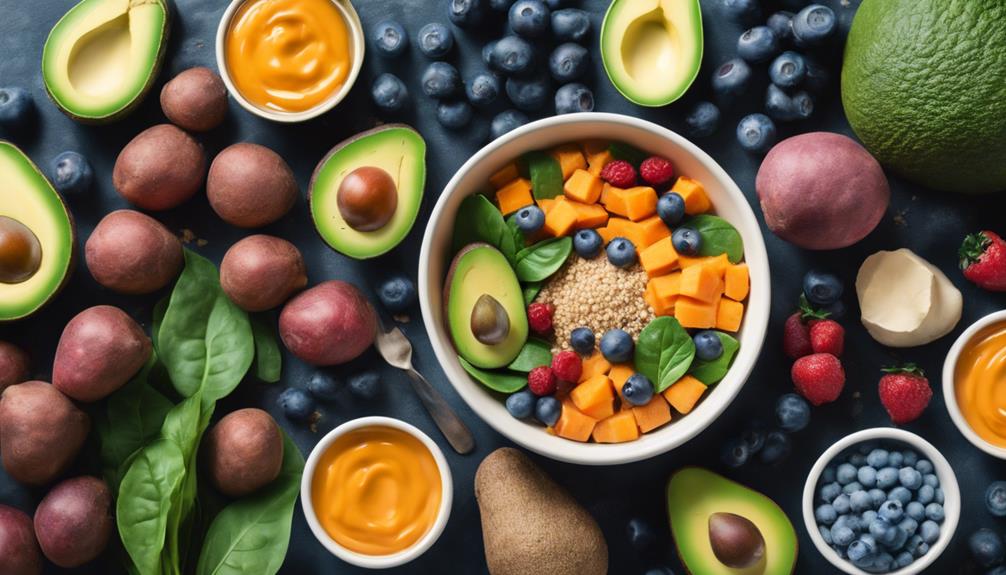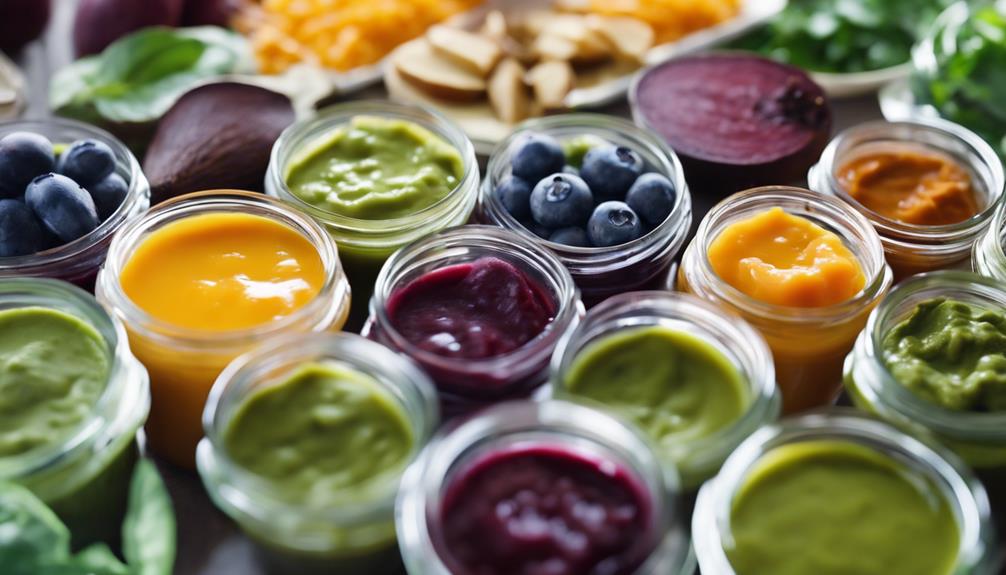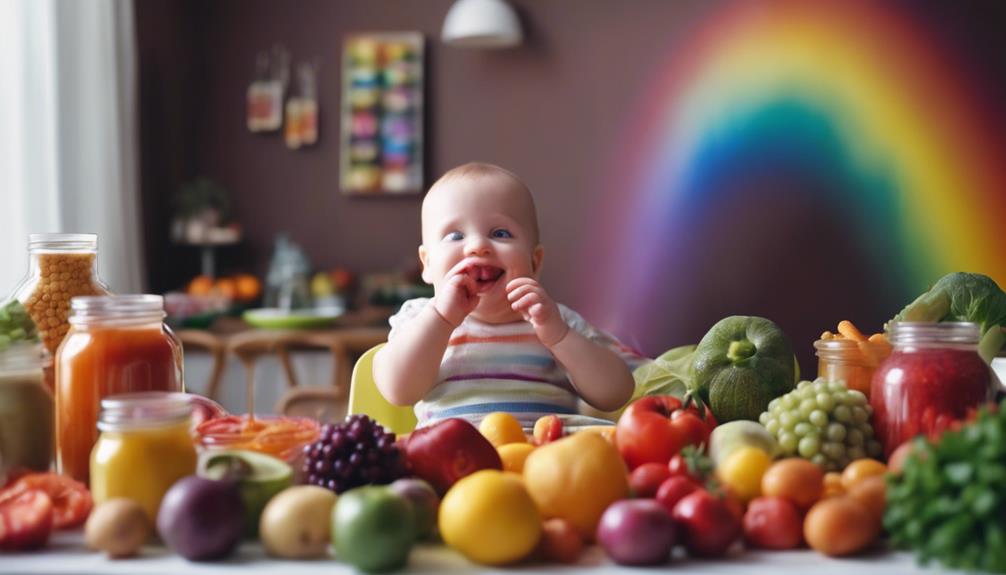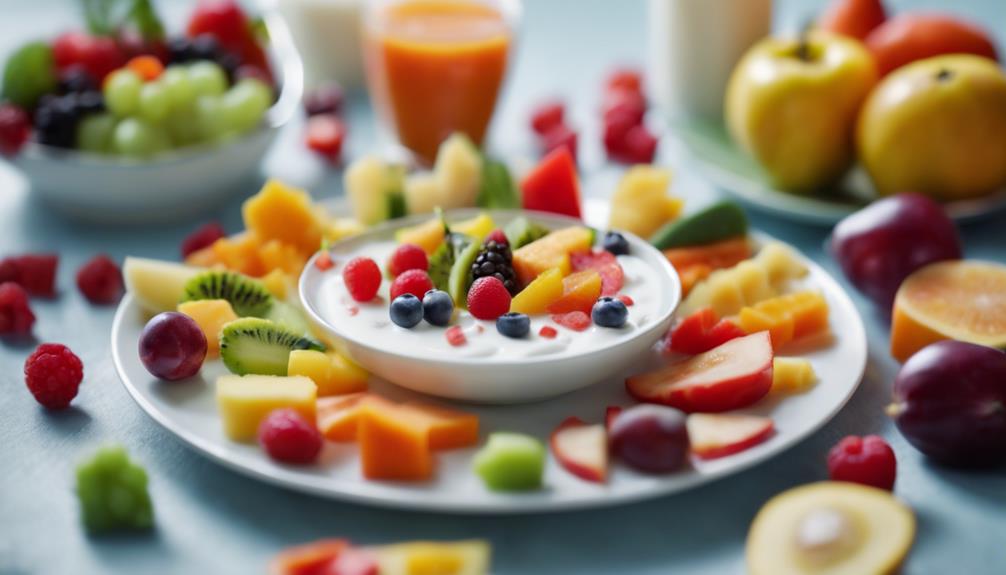Discover a variety of nutrient-packed baby food recipes to promote healthy eating habits from an early age. Include essential ingredients such as sweet potatoes for vitamins A and C, brown rice for digestion, and chicken for protein. Experiment with easy homemade purees using fresh sweet potato and butternut squash to introduce iron-rich foods. Get innovative with flavor combinations like mango and avocado or cinnamon and thyme. Remember to store any leftovers in sealed containers or ice cube trays for extended freshness. Find additional tips to make mealtime both fun and nutritious.
Key Takeaways
- Nutrient-dense ingredients like sweet potatoes and brown rice are essential for baby food recipes.
- Simple homemade purees with fresh ingredients support growth and development.
- Creative flavor combinations like mango and avocado offer diverse taste profiles for babies.
- Store homemade baby food in sealed containers or ice cube trays for convenient serving and storage.
- Freeze homemade baby food in ice cube trays for up to three months to maintain freshness.
Baby Food Recipes Introduction
Begin a delightful culinary journey for your little one with the introduction of baby food recipes. Baby food combinations play an important role in guiding babies to solid foods, guaranteeing they receive a nutritious diet essential for growth and development.
Homemade baby food recipes are a fantastic way to instill healthy eating habits from an early age. By introducing diverse textures through these recipes, you can expand your baby's palate and provide them with a wide array of flavors to explore.
Recipes for babies range from simple purees to more complex gourmet combinations, catering to the various stages of your baby's development. These recipes not only offer a wide range of nutrients but also help in establishing a foundation for a lifetime of healthy eating habits.
Choosing Nutritious Ingredients

When creating homemade baby food recipes, prioritize selecting nutrient-dense ingredients such as sweet potatoes, brown rice, chicken, pears, and bananas. Sweet potatoes are rich in vitamins A and C, providing essential nutrients for your little one's growth.
Brown rice offers whole-grain goodness, aiding in proper digestion and energy levels. Incorporating chicken into your baby's diet guarantees an intake of protein necessary for muscle development.
Pears contribute fiber and natural sweetness, while bananas are gentle on the stomach and packed with potassium.
To enhance the flavors and textures of your homemade baby food, consider using cooking liquid to adjust consistency. Remember to introduce new foods one at a time to monitor for any allergies or sensitivities.
Opt for ripe fruits to maximize taste and nutritional benefits in your baby's meals. By carefully selecting these nutrient-dense ingredients, you can create delicious and wholesome baby food recipes that support your child's healthy development.
Simple Homemade Purees

To introduce your baby to a variety of flavors and textures, consider preparing simple homemade purees using fresh ingredients like sweet potato, butternut squash, and other wholesome ingredients. Making homemade purees is easy and guarantees your baby gets all the essential nutrients needed for growth and development. By using a food processor, you can create smooth purees that are easy for your baby to eat.
Homemade purees are a great way to introduce iron-rich foods to your baby's diet. These purees can be customized based on your baby's preferences and dietary requirements. They're also a healthier option compared to store-bought baby foods, as they're free from additives and preservatives.
Homemade purees pave the way for your baby to shift from liquid to solid foods, setting the stage for introducing finger foods in the future. So, get creative in the kitchen and start preparing nutritious homemade purees for your little one.
Creative Flavor Combinations

Get ready to tantalize your baby's taste buds with creative flavor combinations in their homemade purees.
- Mixing different foods like mango and avocado or sweet potatoes and peas can offer a nutrient-rich meal bursting with flavor and essential nutrients.
- Combining ingredients such as quinoa, blueberries, and mild chilies can provide a unique culinary experience for your little one, introducing them to diverse taste profiles and textures.
- Experimenting with flavors like cinnamon, mint, or thyme can elevate the taste profile of baby food recipes, making mealtime an exciting adventure for your baby's developing palate.
Storage and Serving Tips

Store homemade baby food in sealed containers in the refrigerator for up to three days to maintain freshness and quality.
When you make homemade baby food, consider using ice cube trays for convenient portioning and longer storage. 'Freeze it in ice cube trays for up to three months,' suggests experts at the American Academy of Pediatrics. This method allows you to thaw only what you need, reducing waste.
When feeding your baby starting solids, remember to thin baby food with breast milk, bone broth, or fermenting liquid to achieve the desired consistency.
To thaw frozen baby food cubes safely, place them in the refrigerator overnight for gradual thawing.
Properly label and date homemade baby food for freezing to keep track of storage times and ensure peak quality.
Consider batch cooking to save time and always have nutritious options on hand for your little one.
Frequently Asked Questions
What Is the Healthiest Way to Make Baby Food?
The healthiest way to make baby food is to prioritize fresh, whole ingredients without added salt, sugar, or preservatives. Control quality and nutrition by cooking lightly, using organic produce, and focusing on nutrient-dense options for best growth and development.
What Is the #1 Most Important Food for Your Baby?
You know breast milk is the top choice for your baby. It's packed with nutrients and antibodies, supporting healthy growth and immunity. The World Health Organization recommends exclusive breastfeeding for the first 6 months. It's nature's perfect food.
What Are the Best Nutrient Rich Foods for Babies?
To give your baby the best nutrition, focus on iron-rich foods like meat, chicken, and fish. Nutrient-dense veggies such as sweet potatoes and broccoli, fruits like pears and bananas, and whole grains like brown rice are all great choices for their growth and development.
How to Make Good Tasting Baby Food?
To make good tasting baby food, enhance flavors with natural sweetness from fruits like ripe bananas. Introduce new tastes using herbs or spices. Experiment with nutrient-rich ingredients such as avocado and blueberries. Combine food groups for balanced meals. Adjust consistency with liquids for better texture.
Conclusion
To sum up, these delectable and nourishing baby food recipes present a fantastic chance to provide your little one with the essential nutrients they need for healthy growth and development.
By selecting wholesome ingredients, getting inventive with flavor combinations, and following proper storage and serving tips, you can guarantee that your baby is receiving the best possible start in life.
Remember, a well-fed baby is a happy baby.










